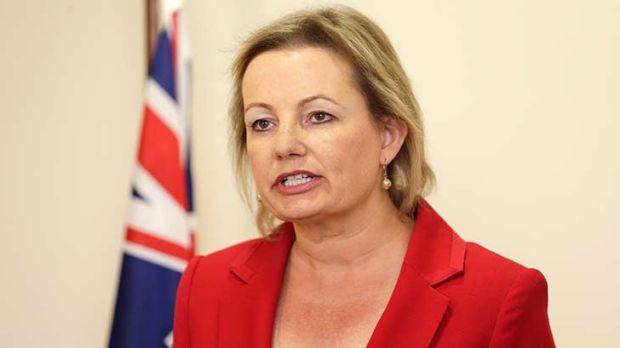
Advice: Sussan Ley faces a tough job in selling the plans to cut Medicare.
The Abbott Government’s second try at Medicare reform lived for barely a month.
In December, Mr Abbott and his then-health minister, Peter Dutton, appeared in the Prime Minister’s courtyard to concede what had long been obvious – that its original proposal for a $7 fee to visit the GP would not pass the Senate.
It’s not an impossible task but it’s a difficult one and it’s a difficult one politically.
Graeme Miller, Family Medicine Research Centre, University of Sydney.
The pair unveiled a new plan which they said was superior to the one announced in the May budget. Vulnerable patients such as children, pensioners and nursing home residents would be exempt from a $5 cut to the Medicare rebate. This concession dramatically reduced the savings to the budget. To make up the difference, the government added two new elements. An indexation freeze on Medicare rebates would be extended until 2018, and Medicare items would be redefined with the effect that the rebate for consultations of less than ten minutes would be slashed by more than half.

Concession: Peter Dutton was voted Australia’s worst ever health minister in a poll of doctors. Photo: Andrew Meares
The latter measure, framed by the government as a quality control measure designed to deter “six minute medicine” (the practice of doctors seeing many patients quickly to maximise their incomes), initially received cautious support from some doctors’ groups.
But in their surgeries, many were furious about the cut, which would see a nine-minute consultation cut from $37 to $17, and they soon shared their anger with their representatives.
“No issue in recent memory has provoked the anger among doctors and patients that this rebate cut has,” AMA president Brian Owler said this week.
The government had sought to circumvent Senate opposition by introducing the change through regulation, betting Senators would baulk at supporting a disallowance motion. But they called the government’s bluff, and by Wednesday, when Labor leader Bill Shorten announced Labor would join Greens and other crossbenchers to overturn the changes, it was clear they were doomed.
By Thursday, the new Health Minister, Sussan Ley, had cut short her holiday to announce that the changes to short consultation items would not take effect on Monday as planned.
Ms Ley promised a fresh start, a process of genuine consultation with doctors about Medicare reform.
But she remains committed to the principle that has dominated the Abbott Government’s health agenda in its first term: introducing a “price signal” to Medicare.
“Doing nothing is not an option,” Ms Ley said.
“In the last decade, spending on Medicare has more than doubled from $8 billion in 2004 to $20 billion today, yet we only raise $10 billion from the Medicare levy. Spending is projected to climb to $34 billion in the next decade to 2024”.
Medicare is a source of national pride and being seen to attack it is politically perilous. The short-lived $2.50 co-payment introduced by the Hawke Government in 1991 was exploited by Paul Keating to oust his rival as Prime Minister. Peter Dutton’s $7 co-payment undoubtedly contributed to doctors voting him the worst Health Minister in living memory in a poll by Australian Doctor magazine.
Now the task falls to Ms Ley, the former pilot, air traffic controller, shearer’s cook and accountant.
Her task is made particularly difficult by the make up of the Senate. The coalition need the votes of six of the Senate crossbenchers to pass any legislation which lacks support from Labor or the Greens.
Part of the challenge of getting Senate agreement is the lack of consensus that there is even a problem with Medicare that needs to be solved.
Labor, the Greens and some of the crossbenchers reject the coalition’s argument that Medicare spending is growing at an unsustainable rate, pointing to international comparisons showing Australia’s health spending as a proportion of economic output is relatively modest at just over nine per cent. They point out that the Medicare levy has only ever covered about half the cost of the scheme.
And researchers such as Graeme Miller, the medical director of the Family Medicine Research Centre at the University of Sydney, dismiss the issue of “six minute medicine,” the primary rationale for the change to rebates for short visits, as a myth.
He points out that just 10 per cent of GP visits are six minutes or less, and these short consultations account for just three per cent of all time GPs spend with patients.
Associate Professor Miller acknowledges the need to contain the health budget, and says Ms Ley’s task is to develop new payment models which deliver quality care to patients and reasonable remuneration to doctors, while stabilising costs.
“It’s not an impossible task but it’s a difficult one and it’s a difficult one politically,” Associate Professor Miller says.
He says one overlooked savings opportunity is greater use of salaried medical specialists rather than consultants who are paid on a fee for service basis.
“That seems a no-go area,” he says.
Associate Professor Miller says a move away from fee-for-service in general practice, towards a block funding model where doctors are paid a certain amount to look after a given patient based on the complexity of their condition, had shown potential overseas for controlling costs and improving quality.
The powerful Australian Medical Association can be expected to fight any changes which threaten doctors incomes, and effectively mobilised their usually politically conservative membership against the December changes.
“GPs are not highly political animals by any means, until you poke the bull ant’s nest, and if you do that, they become very political, very quickly, even if they don’t realise that’s what they’re doing,” says says former Australian Medical Association president Kerryn Phelps, who owns two GP clinics in Sydney.
As she travels around the country in the coming weeks, Ms Ley will face no shortage of advice.
